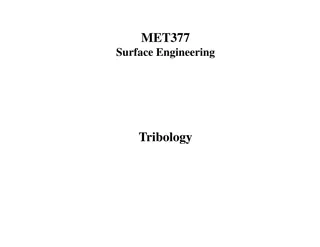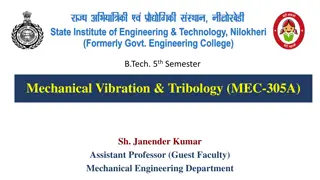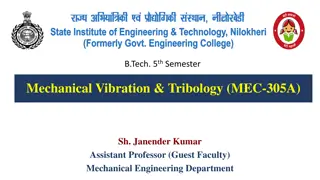Tribology: The Science of Interacting Surfaces
Tribology is the study of friction, lubrication, and wear of surfaces in relative motion. It plays a crucial role in various industrial applications, with economic significance and implications on failure rates in engineering systems. The discipline focuses on surface interactions, forces transmissi
5 views • 41 slides
Nonlinear Curve Fitting Techniques in Engineering
Utilizing nonlinear curve fitting techniques is crucial in engineering to analyze data relationships that are not linear. This involves transforming nonlinear equations into linear form for regression analysis, as demonstrated in examples and methods such as polynomial interpolation and exponential
0 views • 18 slides
Newton's Interpolating Polynomials in Mechanical Engineering
Explore Newton's interpolating polynomials in the context of Mechanical Engineering, specifically focusing on numerical methods and interpolation techniques. Dr. Mohamed El-Shazly, an Associate Professor of Mechanical Design and Tribology, guides students through the concepts and applications of New
4 views • 17 slides
Combined Effect of Magnetic Fluids and Variable Viscosity on Lubrication of Finite Journal Bearings
Study investigating the impact of magnetic fluids, couple stresses, variable viscosity, and velocity slip on the lubrication of finite journal bearings. The research focuses on pressure distribution, load-carrying capacity, and frictional coefficient in the context of tribology.
2 views • 19 slides
Economic Aspects of Tribology and Types of Lubrication in Mechanical Engineering
Understanding the economic impact of friction and wear on machine parts is crucial to preventing costly failures in manufacturing industries. Implementing tribological strategies can help reduce these failures. The types of lubrication, such as boundary, hydrostatic, and hydrodynamic, play key roles
3 views • 14 slides
Tribology: Friction, Wear, and Lubrication in Mechanical Engineering
Mechanical Vibration & Tribology delves into the science of interacting surfaces in motion, focusing on friction, wear, and lubrication. Tribology aims at controlling friction, preventing wear, and optimizing lubrication to enhance equipment reliability and reduce breakdowns.
1 views • 18 slides
Tribology: Friction, Wear, and Lubrication in Mechanical Systems
Explore the fundamentals of tribology, the study of interacting surfaces in motion, encompassing friction, wear, lubrication, and bearing design. Learn how these factors impact mechanical systems, affecting efficiency, performance, and reliability across various industries.
6 views • 20 slides






